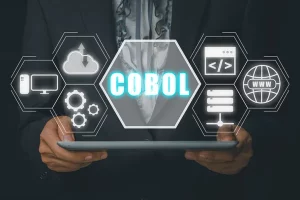The world of technology is constantly evolving, and IBM is leading the charge with an innovative AI solution that could transform how programming languages communicate. Enter COBOL, the venerable programming language dating back to the late 1950s. With over 800 billion lines of COBOL code in use, modernizing this language presents a unique challenge. IBM’s answer? The groundbreaking Code Assistant for IBM Z, an AI-driven tool set to bridge the gap between COBOL and Java.
Also Read: IBM’s ‘Brain-like’ AI Chip Promises Green and Efficient Future

The Challenge of COBOL: Balancing Tradition and Modernization
COBOL’s legacy is undeniable, but its complexity has often posed challenges for programmers seeking efficiency and flexibility. Moving to newer languages like Java is a logical step, but it’s far from simple. Large organizations face an uphill battle due to the scarcity of COBOL experts and the intricacies of migration. For instance, the Commonwealth Bank of Australia spent over $700 million and five years to replace its core COBOL platform in 2012.
The AI-Powered Solution: Code Assistant for IBM Z
IBM’s Code Assistant for IBM Z is set to revolutionize the modernization of COBOL applications. The platform harnesses the power of AI to translate COBOL code into Java, combining the best of both worlds. Expected to be available in Q4 2023, Code Assistant for IBM Z promises to reshape the programming landscape.

The objective of Code Assistant for IBM Z is to empower businesses to restructure their mainframe applications while preserving performance and security. This AI-powered tool is designed to simplify the refactoring process, making it more accessible for developers and organizations seeking to modernize their software infrastructure.
Also Read: Google Introduces Project IDX: An AI-Powered Browser-Based Developer’s Haven
The Engine behind the Magic: CodeNet’s AI Brilliance
Running on the CodeNet model, Code Assistant is armed with AI prowess. This cutting-edge model comprehends COBOL, Java, and an impressive array of 80 programming languages. This allows it to decipher, process, and transform code efficiently and accurately.
Also Read: Codey: Google’s Generative AI for Coding Tasks
Future-Proofing Applications: AI Beyond COBOL
IBM’s vision extends beyond the realm of COBOL-Java translation. The Code Assistant product family, which includes Watsonx Code Assistant for Red Hat Ansible Lightspeed, is a testament to the company’s commitment to a comprehensive AI-powered future. Armed with a rich understanding of over 115 coding languages, IBM’s watsonx.ai code model aims to redefine the landscape of code automation.

Shaping Hybrid Computing: The Road Ahead
The significance of Code Assistant goes beyond immediate modernization. With approximately 84% of IBM’s mainframe customers relying on COBOL, this tool is a bridge to the future of hybrid computing environments. IBM envisions a broader application for code-generating AI tools, positioning itself to rival offerings like GitHub Copilot and Amazon CodeWhisperer.
Also Read: Meta Releases CodeCompose- AI-Powered Alternative to GitHub’s Copilot
Our Say
As IBM forges ahead with Code Assistant for IBM Z, the programming landscape stands on the brink of transformation. AI’s integration into the COBOL-Java translation process heralds a new era of efficiency, accessibility, and innovation. IBM’s focus on comprehensive AI tools modernizes existing systems, shaping a future where AI is the bedrock of programming across platforms and languages. The code-generated future is upon us, and IBM is at the forefront of this exhilarating revolution.

